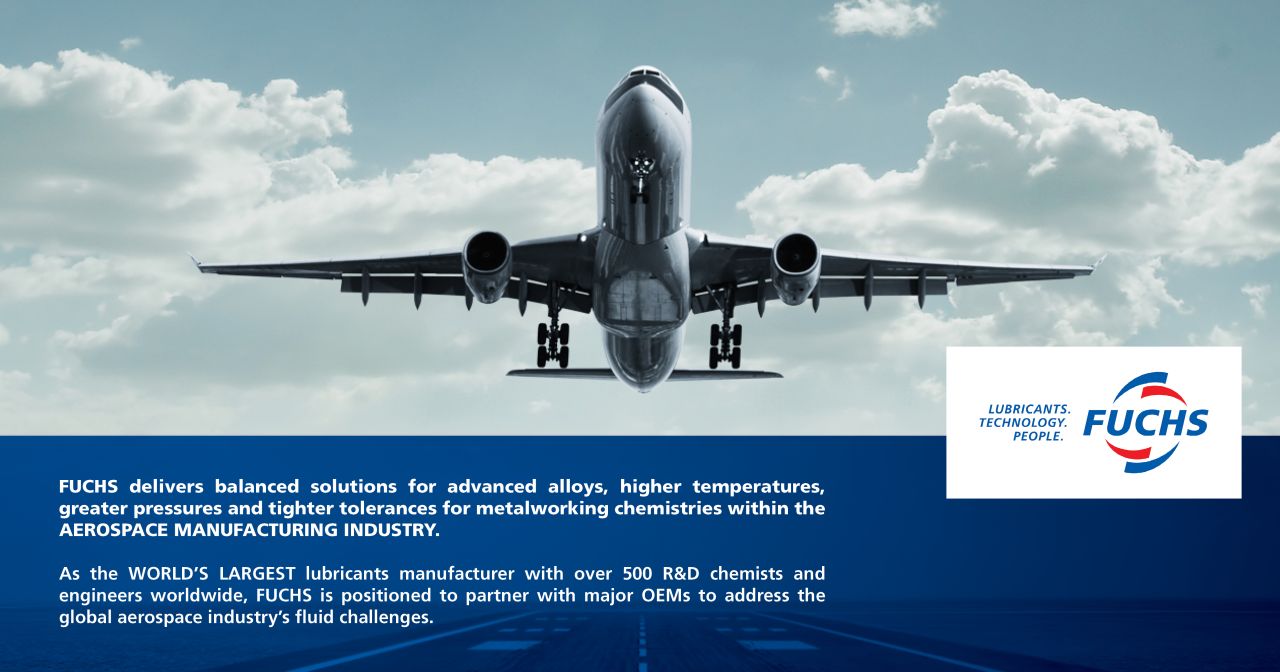ECOCOOL GLOBAL water-miscible machining fluids
14 AUG | Industrial Segment News
FUCHS delivers balanced solutions for advanced alloys, higher temperatures, greater pressures and tighter tolerances for metalworking chemistries within the manufacturing market segment.
ECOCOOL
There are many challenges on the horizon for manufacturers and their suppliers. Formulation, selection, and care of machining fluids play a vital role in meeting the challenges in many of these areas.
The manufacturing industry is faced with advanced alloys, higher temperatures, greater pressures, and tighter tolerances than ever before. This creates a need to balance metalworking chemistries to adequately lubricate and cool without staining the work piece or generating residues.
Further, controlling biological growth is an ongoing challenge throughout the metalworking industry and is growing exceedingly more challenging with recent biocide shortages and increasing global chemical restrictions.
Advanced alloys often incur higher generation of temperatures in the tool bite. The design of many new machining systems has decreased recovery time in smaller sumps. The combination of these factors requires the use of more innovative and robust fluids. Advanced lubricity additives, stable particle size, optimum wetting agents, air release additives, and the overall chemistry of these fluids helps minimise generation of and the dissipation of heat from the tool-work piece interface. Innovative formulations optimise tool life, part tolerances, quality, and surface finish with challenging alloys and machining conditions.
High pressure coolant spray is essential for optimal cooling and chip evacuation but can lead to foaming issues causing HSE concerns, shearing of additives, and premature tool wear. To achieve outstanding performance and aerospace alloy compatibility, enhanced de-foamer chemistries are needed. In addition to high pressure delivery dissipating heat, an optimal blend of shear stable lubricity additives will also minimise heat generation in the tooling, holder, and work piece. Many effective lubricity additives are widely used in automotive and general machining industries but are not acceptable in the aerospace industry. Experience, thorough knowledge, and access to alternative global additive chemistries is necessary in order to provide effective fluids to the aerospace industry.
Sustainability, environmental considerations, global acceptability of chemicals, operator acceptability, and overall workplace conditions continue to increase in importance. Many common chemicals used to control biological growth are under increased scrutiny and regulations on a global basis. Boron, secondary amines, and registered biocides are currently the most common means of controlling biological growth in metalworking fluids but face current and pending global restrictions.
Further, controlling biological growth is an ongoing challenge throughout the metalworking industry and is growing exceedingly more challenging with recent biocide shortages and increasing global chemical restrictions.
Advanced alloys often incur higher generation of temperatures in the tool bite. The design of many new machining systems has decreased recovery time in smaller sumps. The combination of these factors requires the use of more innovative and robust fluids. Advanced lubricity additives, stable particle size, optimum wetting agents, air release additives, and the overall chemistry of these fluids helps minimise generation of and the dissipation of heat from the tool-work piece interface. Innovative formulations optimise tool life, part tolerances, quality, and surface finish with challenging alloys and machining conditions.
High pressure coolant spray is essential for optimal cooling and chip evacuation but can lead to foaming issues causing HSE concerns, shearing of additives, and premature tool wear. To achieve outstanding performance and aerospace alloy compatibility, enhanced de-foamer chemistries are needed. In addition to high pressure delivery dissipating heat, an optimal blend of shear stable lubricity additives will also minimise heat generation in the tooling, holder, and work piece. Many effective lubricity additives are widely used in automotive and general machining industries but are not acceptable in the aerospace industry. Experience, thorough knowledge, and access to alternative global additive chemistries is necessary in order to provide effective fluids to the aerospace industry.
Sustainability, environmental considerations, global acceptability of chemicals, operator acceptability, and overall workplace conditions continue to increase in importance. Many common chemicals used to control biological growth are under increased scrutiny and regulations on a global basis. Boron, secondary amines, and registered biocides are currently the most common means of controlling biological growth in metalworking fluids but face current and pending global restrictions.
The need for new, safer chemistries means innovation, extensive research and development, new approvals, and a sustainable global supply chain. Overall fluid cost and performance awareness is necessary moving forward. The focus on per gallon costs must shift to a focus on the overall impact of fluids throughout the entire process. Criteria for fluid performance includes the influence on all cost centers including productivity, tooling, quality, scrap, filtration, waste treatment and disposal, and HSE concerns.
Customer Service
AUS 1800 1800 13
NZ 0800 382 476
